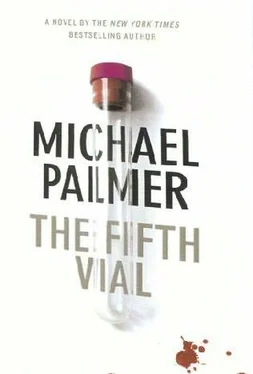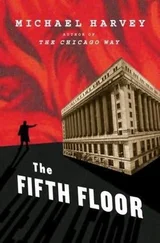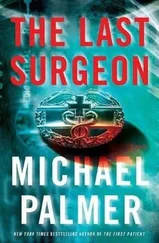Michael Palmer - The fifth vial
Здесь есть возможность читать онлайн «Michael Palmer - The fifth vial» весь текст электронной книги совершенно бесплатно (целиком полную версию без сокращений). В некоторых случаях можно слушать аудио, скачать через торрент в формате fb2 и присутствует краткое содержание. Жанр: Триллер, на английском языке. Описание произведения, (предисловие) а так же отзывы посетителей доступны на портале библиотеки ЛибКат.
- Название:The fifth vial
- Автор:
- Жанр:
- Год:неизвестен
- ISBN:нет данных
- Рейтинг книги:4 / 5. Голосов: 1
-
Избранное:Добавить в избранное
- Отзывы:
-
Ваша оценка:
- 80
- 1
- 2
- 3
- 4
- 5
The fifth vial: краткое содержание, описание и аннотация
Предлагаем к чтению аннотацию, описание, краткое содержание или предисловие (зависит от того, что написал сам автор книги «The fifth vial»). Если вы не нашли необходимую информацию о книге — напишите в комментариях, мы постараемся отыскать её.
The fifth vial — читать онлайн бесплатно полную книгу (весь текст) целиком
Ниже представлен текст книги, разбитый по страницам. Система сохранения места последней прочитанной страницы, позволяет с удобством читать онлайн бесплатно книгу «The fifth vial», без необходимости каждый раз заново искать на чём Вы остановились. Поставьте закладку, и сможете в любой момент перейти на страницу, на которой закончили чтение.
Интервал:
Закладка:
"I'm using the animal room," Levitskaya said, her dense accent vintage Count Dracula.
Not already, Natalie sighed to herself. The little lift that remained from putting the St. Clement's boys in their place vanished.
"I just stopped by there, Tonya," she said with artificial cheer. "The room's empty."
"Well, I am about to use it."
"Tonya, I'll be done in twenty minutes."
"Just do it later."
"Tonya, please don't do this. I'm having a very tough time and — "
"Or better still, do it tonight while you're in here working until midnight and making the rest of us look lazy."
People skills, Natalie reminded herself. That's what the dean and Terry had said she needed to work on. People skills.
"Tonya," she said, smiling sweetly, "if you don't back off and stop giving me a hard time, I'm going to flatten your nose across your face."
There, how's that for people skills?
Levitskaya stepped forward. She was a stocky woman, a little taller than Natalie, and heavier by thirty pounds or more. Her crooked smile suggested she had faced challenges like this one before, and wasn't even considering backing down.
Damn, Natalie thought. Well, what's the worst thing that can happen?
The last time she had been in a fistfight had been in her junior year at the Newhouse School. She had come away with fractures of her nose and one knuckle, loudly claiming victory over the other girl, who was virtually unscathed. Would she ever learn to pick fights with people she actually had a chance against?
"How about in the hallway where we can't wreck anything?" she said, resigned to taking a pounding.
"Ladies," Spencer Green called out from across the lab, ignoring the conflict he couldn't have helped but hear, "that was Doug on the phone. He says both of you are supposed to be in the follow-up clinic with him right now."
Levitskaya's eyes narrowed as if she were calculating whether she could finish Natalie off and still make it to the clinic with minimal delay. Finally, with a shrug that said some other time, she headed out the door. Natalie debated staying with her mice, but then put them back and followed. Berenger clearly considered her part of his service regardless of her standing in the medical school — a gesture that was worth respecting.
The clinic space, used by various services on different days, was four examining rooms, a consultation office, and a small waiting area on the sixth floor of the Hobbs Building. This afternoon was given to Berenger's transplant patients, probably five or six of them. He was averaging about two transplants every three weeks, but the number would have been much higher had there been more donors. As things were, the number of people dying for want of a donor heart far exceeded the number saved by a transplant.
By the time Natalie arrived at the clinic, Levitskaya was already in the consultation room mooning at Berenger. Natalie was surprised to note that the woman's respiratory rate was normal, knowing she had to have sprinted over from the lab.
Seated behind his desk, Berenger was every bit the med school professor of cardiac surgery, square-jawed and steely-eyed, with wonderful, long fingers. Respected by patients, students, and faculty alike, he was a world-renowned lecturer and researcher, yet most of the time as humble as such a man could be. Natalie had met his wife and teenage daughters on several occasions, and knew enough to believe that if Berenger cut any corners in his remarkably complex existence, it was with them.
"So," he said, "there was some misunderstanding in the lab?"
Green.
"We have straightened things out," Levitskaya said quickly, smiling around nearly clenched teeth.
"Ready to go," Natalie added with exaggerated cheer. "I appreciate being included."
"You both know this is all about teamwork, right?"
"Right," the two women answered in unison.
"Well, Mr. Culver is in the next room. He's three months postop. Tonya, you know this man, so brief Natalie and bring her in to observe your evaluation. Natalie, let's talk afterward."
The cardiac surgical resident led Natalie to the hall, then gave a thirty-second, totally unenthusiastic presentation of a forty-seven-year-old truck driver who had developed cardiomyopathy — heart swelling of unknown cause — and managed to get a lifesaving transplant after two years of progressive cardiac failure with profound shortness of breath and massive fluid retention. Medically, he had done quite well since the surgery.
Culver, first name Carl, was a husky, swarthy man with thick brows, a wide pancake face, and disconcertingly small eyes. But there was something even more unappealing than his appearance — he reeked of cigarettes. In her presentation, Levitskaya had made a point of saying that he was once a heavy smoker, but had kicked the habit as his breathing deteriorated and he was made to see that his continued smoking would all but eliminate him from the transplant list. Clearly, he had fallen off the abstinence wagon.
Without so much as a greeting or a handshake, the Russian exploded.
"Goddamn it, Carl," she said in a near shout, "you stink of cigarettes!"
"Well, I got laid off and my daughter got sick, so — "
"No excuses. Do you have any idea how many hours and how much money went into putting that new heart into your chest, to say nothing of the poor man who gave it to you or the many, many others who did not get a chance at it? And here you are, smoking like a chimney, doing your best to destroy it."
"But — "
"No buts. I am going to see if Dr. Berenger even wants to speak with you. If not, then I want you to get out and only come back when you have stopped smoking again. What a waste this is of a heart that could keep a nonsmoker alive for years."
She brushed past Natalie and stormed from the room, leaving Carl Culver bewildered, frustrated, and angry.
"I'm sorry about your job, Mr. Culver," Natalie said.
"Thanks. I'm sorry about the cigarettes, Doc, I really am. But it's hard, especially when things aren't going well."
"Is your daughter very ill?"
"She had a seizure. They thought she might have a brain tumor, but it turned out to be migraines. Honest, Doc, I'll try to stop, I really will."
"You really need to keep trying," Natalie said, moving forward and putting her hand on his shoulder. "Your daughter needs you more than ever now. I know it's hard, but you've really got to keep trying."
At that moment, the door opened and Berenger entered, followed by a still crimson-faced Levitskaya. Over the ten minutes that followed, Natalie's mentor put on an instructional clinic on how to be a doctor, making constant, honest eye contact with his patient, reasoning, not chastising, asking about his family and his situation at home, calming him down, touching him reassuringly on the arm, yet all the while counseling him on the dangers of continued smoking. Quiet, stern, concerned, empathetic, understanding, unwavering.
"I hear some wheezes, Carl," he said after examining the trucker. "That's bad — very bad. Now it's time for you to go to work on this problem. I'm going to refer you to our SSN program — that's Stop Smoking Now. But the doctors and social workers there can only go so far. You've got to do the rest."
"I will, Dr. Berenger. I promise I will."
"You need to exercise more. Do you have a Y near you?"
"I…I think so."
"I want you to stop at cardiac rehab on your way out of the hospital. I'll call and have them go over your exercise program again. If there is a Y, they'll call the people there and sign you up. If money is a problem, talk to the SSN people. They have some funds available. Now I did a beautiful job on you. No more messing it up."
"Thanks, Doc. I'll do better. I promise."
"Your family needs you."
Читать дальшеИнтервал:
Закладка:
Похожие книги на «The fifth vial»
Представляем Вашему вниманию похожие книги на «The fifth vial» списком для выбора. Мы отобрали схожую по названию и смыслу литературу в надежде предоставить читателям больше вариантов отыскать новые, интересные, ещё непрочитанные произведения.
Обсуждение, отзывы о книге «The fifth vial» и просто собственные мнения читателей. Оставьте ваши комментарии, напишите, что Вы думаете о произведении, его смысле или главных героях. Укажите что конкретно понравилось, а что нет, и почему Вы так считаете.












